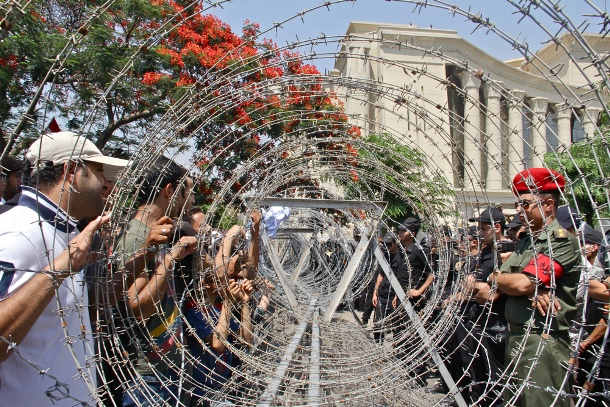
With the Supreme Constitutional Court’s decision to dissolve the newly elected parliament and uphold Ahmed Shafik’s disputed candidacy, accusations have been levied against Egypt’s judicial system, questioning its impartiality.
Countless court cases in the past 16 months have yielded disappointing results: Egypt’s courts have witnessed the acquittal of both police officers and high level Ministry of Interior officials over the past year. Consequently a vocal section of the Egyptian public and its political representatives have lost faith in the neutrality and independence of the judicial process.
Regardless of that loss of faith, many issues hang in the balance, as decisions are anticipated from the courts that could set an already winding path into a tailspin.
With many other variables to consider that are to take place far from Cairo’s courts, the imminent cases are enough to make it impossible to guess where Egypt will be three months, let alone three days, down the line.
Annulment of the runoff between Mohamed Morsy and Ahmed Shafik
A lawsuit demanding the annulment of the runoff election between Mohamed Morsy and Ahmed Shafik is to be reviewed by the Administrative Court on June 26, a full three days after the results are to be announced; unless of course the Presidential Elections Committee (PEC) chooses to delay the results once again.
Not the first case of its kind, the courts threw out a lawsuit filed by former presidential candidate Abul Ezz El Hariry, in which he called the entire electoral process into question as a result of Article 28 of the Constitutional Declaration. The article states that any decisions made by the PEC cannot be disputed.
This time around, however, the focus has turned towards the Freedom and Justice Party (FJP), and its presidential candidate Mohammed Morsy, as well as his opponent Ahmed Shafik.
Both candidates have been accused of violating the 48-hour pre-election silence period, with Morsy’s campaign facing an additional list of alleged violations: Members of the Muslim Brotherhood have been accused of distributing food in exchange for votes, and election monitors are being charged with marking ballots in favor of Morsy.
The likelihood of seeing a decision in favor of the annulment is slim, but the very fact that a court case of this kind is being considered is a reminder of the political power increasingly being asserted by Egypt’s courts – impartial or otherwise.
Dissolution of the Muslim Brotherhood and the Freedom and Justice Party
At the request of the Muslim Brotherhood’s attorney, the lawsuits demanding the dissolution of both the group and its political arm, the Freedom and Justice Party (FJP), have been adjourned until September.
Amid increasing arguments amongst the lawyers, leading to the inevitable fracas that seems to have become a routine event within Egypt’s courts, the case against the Muslim Brotherhood has been adjourned until September 1, while a similar lawsuit filed against the FJP has been adjourned until September 4.
The lawsuit accuses the FJP of violating the ban against forming political parties rooted in a religious ideology and has called for not only of the dissolution of the group, but also for the freezing of its assets.
With the FJP fielding Morsy in the presidential elections, the dissolution of the party would call into question his very candidacy, a decision which will come months after the election results are announced.
With the Muslim Brotherhood, a coalition of independent judges and mainstream media placing the victory firmly in Morsy’s hands, the lawsuit and its delay leave a somewhat uncertain future as far as who could eventually earn the accolade of Egypt’s first democratically elected president, and whether or not the title will be warranted.
Appeal against the dissolution of Parliament
The Supreme Constitutional Court’s decision to dissolve parliament has not gone unchallenged. Islamist parties, reluctant to relinquish their legislative majority without a fight, have filed an appeal against its dissolution that is currently being considered by the State Council.
Some non-Islamist members of parliament, on the other hand, welcomed the court’s decision to shut down the recently elected body, claiming the court was within its legal right to do so, criticizing only the speed at which the highly politicized decision was made.
With confusion reigning over whether or not one third or the entire parliament was to be disbanded, the Freedom and Justice Party is joined by the Wasat Party as well as the ultraconservative Salafist Nour Party, in its complaint.
If the decision were to be reversed, Egypt could find itself with both an Islamist president and an Islamist-dominated parliament.
However, if a new round of parliamentary elections were to take place a few months down the line, after the drafting of a new constitution – as stipulated in the SCAF’s latest constitutional declaration — there is always the distinct possibility that the Freedom and Justice Party, which has time and time again proved its ability to mobilize people in its favor through the ballot boxes, could once again find itself in a dominant position in the second parliament Egypt has seen in the space of one year.
The only thing we can be sure of at this point is that nothing is certain.
Photo Credit: Mos’ab Elshamy
Image: SCC.jpg
